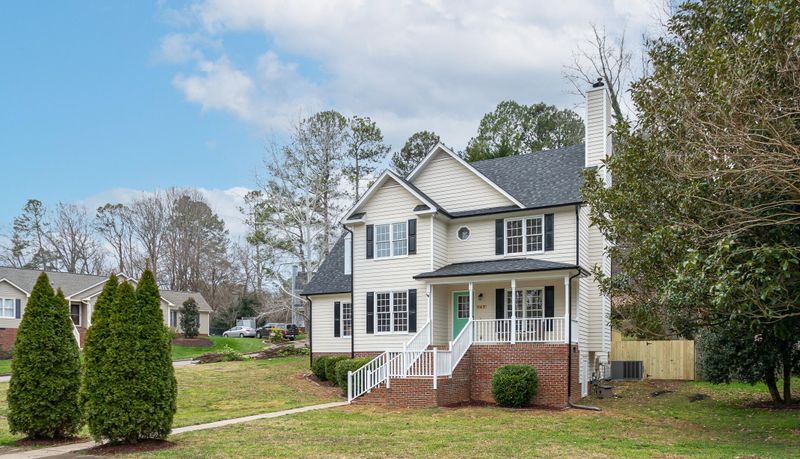EZ Home Search Guide to Living in McDowell County, NC
EZ Home Search Guide to Living in McDowell County, NC
Have you imagined living in a serene forest setting? Are you someone who enjoys hiking, mountain biking, camping, or getting away from it all? Then you need to check out McDowell County, North Carolina. This vacation destination is also a great place to live.
McDowell County is a predominantly rural section of the North Carolina mountains, with a protected landscape covered in forest. It offers numerous recreational activities, from spelunking through caves to calm and quiet walks through the woods.
Explore McDowell County and see if it could be the right place for you to call home.
About McDowell County
McDowell County is part of the southern Appalachian Mountains region. The landscape rises rapidly from the rolling Piedmont hills in the south to the Blue Ridge Mountains in the north and west. The lowest elevation is 969 feet above sea level along Cane Creek, and the land rises to 5,665 feet at Grandfather Mountain in the Blue Ridge. Lake James is part of the county’s northeastern border.
McDowell County is surrounded by Mitchell, Avery, Burke, Rutherford, Buncombe, and Yancey Counties. Much of the landscape is protected areas: the Blue Ridge Parkway, Pisgah National Forest, Lake James State Park, Fonta Flora State Trail, and the South Mountains Game Lands.
One advantage residents have is McDowell County’s low cost of living. The Best Places Cost of Living Index places the national average at 100; McDowell County comes in at an overall 81.1. The most expensive cost category was health care, while the least expensive was housing.
Residents enjoy relatively mild weather. On average, there are 212 sunny days per year. In the winter, McDowell County averages seven inches of snow while the US averages 28. The area does see abundant rainfall, averaging 51 in, but that makes the landscape ripe for agriculture and growing your garden. The summer high tops out around 86F degrees while the winter low bottoms out at an average of 24F.
While you will find a lot of mountain roads in McDowell County, you also have access to Interstate 40, which runs east to west, and to the Blue Ridge Parkway, which runs along the northwestern border.
McDowell County History
The archeological evidence shows that native peoples for thousands of years have inhabited the area. The earliest evidence dates to around 250 AD. The Cherokee and the Catawba Indians were known to live in what is modern McDowell County.
It is suspected that the Spanish explorer Juan Pardo explored the McDowell County region in 1566. They built a log blockhouse known as Fort San Juan at the headwaters of the Catawba River, which is north of present-day Morganton, North Carolina. The roughness of the area, native hostilities, and the lack of mineral resources caused the Spanish to give up their efforts to colonize the interior.
John McDowell received a land grant from the North Carolina colony for a property known as Pleasant Gardens near the Catawba River. McDowell went hunting with his friends and came across a lush green valley with thousands of acres of forest. McDowell ended up settling there with his family, receiving more land grants. He led negotiations with Cherokees on his farm, and his son fought in the Battle of Kings Mountain. Today, McDowell County is named in his honor, and McDowell’s home survives in the present day.
During the colonial period and the American Revolution, McDowell was a haven for those traveling between the western wilderness and the more developed lowland areas. Various forts and garrisons were constructed to protect settlers from Cherokee natives protesting the settler’s incursion. Today, these forts no longer exist.
The Carolina gold rush in the early 19th century centered around the southern reaches of the county. Muddy Creek and the mines at Vein Mountain were productive areas. Today, many of these mines and gold rush towns no longer exist, but you can find their scattered ruins and abandoned cemeteries.
McDowell County as we know it today was formed in 1842 from parts of Burke and Rutherford County. Unfortunately, a fire destroyed much of downtown Marion, including its courthouse and many documents from the Civil War and post-Civil War era.
McDowell County Cities and Areas
Marion is the county seat of McDowell County. It is named after the American Revolution hero General Francis Marion, nicknamed “The Swamp Fox.” Marion’s motto is “Where Main Street Meets the Mountains.” It is proud of its city services, neighborhoods, and downtown area. Marion is one of the fastest-growing cities in the area. Since 1970, its population has increased by 158%.
The town of Old Fort is named after the revolutionary era Davidson’s Fort and today is surrounded by the Pisgah National Forest. It has been a spot for travelers to stop while exploring the greater forested region for the last 150 years.
One unique unincorporated area is Little Switzerland, a stop on the Blue Ridge Parkway. It started as a summer resort and was named because its sweeping views resembled the Swiss Alps. Many buildings incorporate Swiss-style architecture.
The other population centers are unincorporated communities near Lake James, Linville Falls, and Glenwood. Eleven townships divide McDowell County.
McDowell County Job Market
Based on the number of employees, McDowell’s County’s top employers are Baxter Healthcare Corporation, the public school system, McDowell County, Auria Solutions USA, Coats Performance Materials, and Love’s Travel Stops & Country Store.
Manufacturing is a leading industry in McDowell County, and it ranks fourth in North Carolina for the percentage of the workforce employed in the manufacturing sector. The county is an Attainment Zone. Local producers include Baxter Health Corporation, International Automotive Components, Ethan Allen Operations, Columbia Forest Products, West Rock Company, and Janesville Acoustics.
In August 2021, the unemployment rate in North Carolina was 4.4%. For McDowell County, it was a reported 4.1%.
McDowell County Real Estate Market
If you were looking for a mountain cabin retreat or small-town living, McDowell County has you covered. You can find agricultural land to set up a family farm, or you can live as part of a close-knit community where everyone knows your name.
County data from September 2021 showed that the number of new listings increased 4.1% year-over-year. Median sales prices dropped 12.9%, bringing the median sales price to $266,750. The average days on the market until the sale was 30, a 74% decrease. The total inventory of homes for sale was still down 32%, even with the bump in new listings. The month’s supply of inventory stood at 2.0 months.
Looking historically at median sales price data, McDowell County’s prices remain relatively stable over the last decade, although they had increased significantly since mid-2020 when they first surpassed the $200,000 mark. Before that, median sales prices were relatively stable from mid-2017 until the beginning of 2020.
In terms of your property taxes, McDowell County charged $0.575 of $100 of assessed value in 2021. The municipalities and fire districts also charge property taxes, and their rates vary based on your address.
Real estate markets fluctuate based on changing economic and supply conditions. To see the most recent data, use the EZ Home Search for McDowell County real estate. Our database updates every 15 minutes.
McDowell County Demographics
The 2020 US Census counted 44,578 people living in McDowell County. The population dropped by about 400 residents from the 2010 census, so we can say the county’s growth rate is stable or very small. The estimated population change was 1.7%.
McDowell County primarily has a dispersed population, with 70% of residents living in a rural area. The median age of a McDowell County resident was 44 in 2019. The age group with the highest number of residents was the 0-19, followed by the over-65 age group. Racially, the county had 92% identify as white alone and approximately 6% identified as Hispanic or Latino.
The median household income from 2015 to 2019 was $43,646. Around 84% of persons over 25 held a high school diploma, while 17% had a bachelor’s degree or higher.
McDowell County Education
McDowell County Schools is a rural school system serving just under 6,000 students for grades K to 12. The district has eight elementary, three middle schools, and three high schools. One of these high schools is an early college school, and one is a school for innovation where students take classes through McDowell Technical Community College.
For higher education, McDowell Technical Community College has a range of programs for residents. The school offers certificates, programs, and two-year diplomas for associate’s degrees or university transfer. Some programs they provide include law enforcement training, applied engineering, business administration, nursing, information technology, cosmetology, electrical systems, and health care management. The college also has a universal advanced manufacturing center with training programs in machining, robotics, welding, HVAC, and customized industry training opportunities.
McDowell County Health Care
Residents are serviced by McDowell Hospital, which underwent a $33 million renovation in 2017. The hospital is the Primary Care Health Network for the Mission Health System in the county. Mission Health runs six rural health clinic sites and eight medical practices. It is the fifth-largest private employer in McDowell County.
The hospital has 65 beds and has medical specialties in family medicine, internal medicine, pediatrics, orthopedics, urology, obstetrics, and gynecology. Other services include cancer care, cardiac rehabilitation, an emergency room, occupational medicine, pain management, a sleep center, sports medicine, and women’s services.
McDowell County Things To Do
McDowell County is a place where you can commune with nature. There are over two hundred miles and counting of trails for hiking, horseback riding, biking, paddling, and fishing. The Pisgah National Forest, the nation’s first national forest, has thousands of acres with beautiful mountain views, wild creeks, and rushing waterfalls. Catawba Falls is a breathtaking experience. The Point Lookout Trail also offers a bird’s-eye view of the mountains and is famous among bikers.
A popular stop is the Blue Ridge Parkway, which winds north of Mount Mitchell to Linville Falls. It crosses through McDowell County and the popular Little Switzerland stop. Motorcyclists seeking a thrill like to ride on the Diamondback, a popular highway loop running on NC 226A, US 221, Toms Creek Road, and NC 80. The twists and turns add to the scenic ride.
Kayaking, canoeing, and water sports are available along Lake James. The Catawba River Park has a canoe/kayak launch, and another launch is in the Curtis Creek area.
If you’d prefer to cast the line, Old Fort is known as a North Carolina Mountain Trout Town. Try one of the trout streams in the Pisgah National Forest or any other nature preserve in McDowell County.
McDowell County Local Attractions
When you’re done admiring the views above ground, get underneath them at Linville Caverns. This attraction inside Humpback Mountain is located at the McDowell and Avery County border and attracts thousands each year. It’s the only cave system open for tours in North Carolina.
For anyone interested in what lies inside the earth, several gem mining operations offer the chance to pan for treasures. The Emerald Mines in Little Switzerland have been operating since 1930.
Linville Gorge was the nation’s first officially designated Wilderness Area, and the Cherokee natives knew it as the “River of Many Cliffs.” Also nicknamed the “Grand Canyon of the East,” many trails are available for experienced hikers.
Another famous attraction is Andrews Geyser, a man-made geyser that was a tourist attraction at the turn of the century. After years of being defunct, it was renovated and restored in 1976.
In Old Fort, the Arrowhead Monument is a 15-foot sculpted granite arrowhead at the Mountain Gateway Museum erected in 1930 to commemorate the Catawba and Cherokee natives who lived in present-day McDowell County. The Mountain Gateway Museum features lifestyle and pioneer-era history from the earliest inhabitants up through the present era.
Davidson’s Fort is a replica of the original fort built in the 1770s as an outpost of the American colonies. Explore scenes from the fort’s history as depicted by local artists and students.
You can find historic houses to visit in McDowell County, such as the Carson House. This location is now a public museum with artifacts showcasing the various times in the county’s history.
Camp Grier in Old Fort is a place for horse riding and mountain biking. It has 600 acres of nature to explore.
The Peavine Rail Line was once an active Norfolk Southern Railway line. Today a 2.4-mile section is open to the public to enjoy as a walking or bicycling trail.
Lake James State Park is at the base of Linville Gorge. It has 150 miles of shoreline and 6,812 acres of water. You can access the reservoir at Black Bear Boat Access, Linville Access Area, or Hidden Cove Access. The Catawba section of the state park has 565 acres with hiking trails, primitive campsites, and picnic areas. The Patty’s Creek section has over 3,000 acres with a swimming beach and canoe rentals.
Emerald Village is a group of historical attractions located in Little Switzerland. Modeled after the style of homes you would see in the European country, the attractions include historic gem mining, dining, and shopping surrounded by mountain views.
McDowell County Dining
Experience the local flavors of the Blue Ridge Mountains. In McDowell County, you’ll find everything from traditional southern and mountain cuisine to modern American like hot dogs and BBQ. McDowell County also has a hopping craft drink scene, with spirits, breweries, and wineries for you to indulge. Follow the Blue Ridge Travelers Craft and Spirit Trail through Nebo to sample the local product.
- The county’s first craft brewer, Mica Town Brewing, has a “Stop and Sip” Tap Room.
- Copper Creek Distillery produces small-batch moonshine varieties.
- Keeper’s Cut Meadery in Marion has a tasting room and a dog-friendly deck.
- English Farmstead Cheese is a quaint shop with a variety of local craft cheeses and other treats.
- Sharon’s Cafe is an old-fashioned southern-style venue serving breakfast and lunch.
- Hook & Anchor Family Seafood has an 18-item buffet and a salad bar.
- Countryside BBQ is famous for its on-site smoked pork BBQ and chicken with southern sides and homemade desserts.
- Burrito Brothers Mexican serves authentic Mexican cuisine and makes everything from scratch.
- The Switzerland Cafe offers a variety of picnic goodies, wines, cheeses, and other items.
McDowell County Shopping
Along the Blue Ridge Parkway and the other small towns scattered around McDowell, you will find locally crafted items awaiting your discovery. Try the Main Street and Catawba Avenue in Old Fort and Marion downtown if you’re looking for handcrafted souvenirs. Little Switzerland has old-fashioned general stores packed with unique gifts and trinkets.
For a complete look at what kind of shopping opportunities await, refer to Shop McDowell, which promotes local businesses.
The historic Marion Tailgate Market takes place from May to October every Tuesday afternoon. You’ll find locally raised meats, eggs, baked goods, and in-season produce.
Living in McDowell County
If the mountain lifestyle sounds appealing to you, McDowell County could be an excellent place for you to call home. With scenic mountain views, rolling forests, and ample room to spread out, you can find your perfect mountain retreat. You’ll benefit from McDowell County’s low cost of living and strong manufacturing economy.






